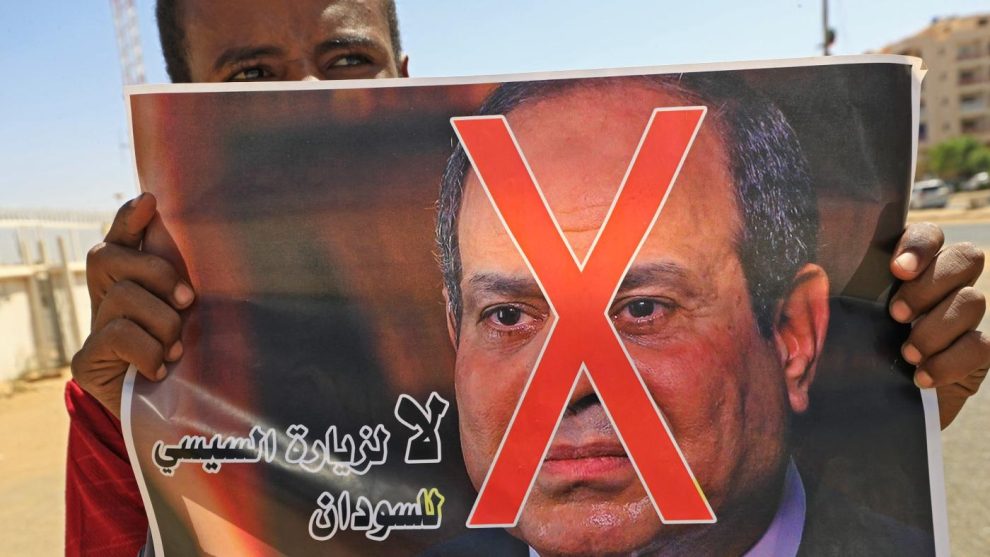Egypt’s failed policies in Sudan have undermined its influence in the region. The recent capture of Egyptian soldiers by RSF forces further underscores this reality.
Just hours after military clashes broke out between the Sudanese army and the paramilitary Rapid Support Forces (RSF), videos of captured Egyptian soldiers went viral on social media.
These soldiers were taken prisoner by the RSF at Merowe Airbase in northern Sudan. Egypt’s military spokesperson released a brief statement claiming that the soldiers were participating in joint training with their Sudanese counterparts.
Two days later, during a meeting with the Supreme Council of the Armed Forces (SCAF), Egyptian President Abdel Fattah el-Sisi asserted that the Egyptian forces present in Sudan were there solely for training purposes and not to take sides. However, it was later revealed that Sisi’s statements were false.
The Egyptian forces in Sudan were not participating in joint training but were instead there to support General Abdel Fattah al-Burhan, the chief of the Sudanese army, and the Sudanese army against his deputy, Mohamed Hamdan Dagalo, also known as Hemeti.
According to The Wall Street Journal, Egypt sent warplanes and pilots to back the Sudanese military. It was also reported that an Egyptian plane destroyed an ammunition depot controlled by the RSF.
Although the Egyptian soldiers returned home, questions about their numbers, duties, and why their presence had not been announced prior to the outbreak of conflict persist.
A shortsighted policy
Egypt’s involvement in the Sudanese conflict reveals its shortsighted policy, complex calculations, and failed strategy which has contributed significantly to the current crisis in Sudan.
Following the removal of former president Omar al-Bashir, Egypt adopted a policy towards Sudan that aimed to achieve two contradictory objectives. On one hand, it relentlessly sought to hinder the establishment of a robust civilian government, let alone a democratic one, during the transitional period.
On the other hand, Egypt feared that Sudan could potentially become a failed state on its southern borders, leading to severe political, geostrategic, and humanitarian crises that it would be unable to manage.
Thus, Egypt believed in establishing a military rule in Sudan despite the fierce civilian resistance and the bitter power struggle between Burhan and Hemeti.
The rationale behind this policy is rooted in intricate calculations. First, Sisi’s government is determined to prevent the emergence of any form of civilian or democratic government on Egypt’s southern borders, as he perceives this as an existential threat with the potential to trigger a domino effect and affect Egypt’s political landscape.
Second, Sisi favours a feeble regime in Sudan that would give Egypt leverage and influence over it, in contrast to the Mubarak-Bashir formula where Sudan’s 30-year reign under Omar al-Bashir caused difficulties and problems for Egypt under President Hosni Mubarak.
Third, Sisi seeks a subservient government that does not have an independent foreign policy that may conflict with Egypt’s foreign policy, particularly on crucial issues such as the Grand Ethiopian Renaissance Dam (Gerd).
Divide and conquer
Over the course of the last four years, Egypt, along with other key regional allies including Saudi Arabia, the UAE, and Israel, has taken significant steps to prevent Sudan from achieving a successful democratic transition.
This concerted effort has been fuelled by a desire to avoid the emergence of a strong and stable civilian government on Egypt’s southern borders, which is viewed as a potential threat to Sisi’s regime.
Initially, Egypt welcomed the power-sharing agreement between the Sudanese junta and civilian forces during the transitional period. However, as the transition progressed, Egypt began to focus on strengthening the military faction within the Transitional Sovereign Council (TSC), led by Burhan and Hemeti at the expense of Abdalla Hamdok’s civilian government. Egypt also sought to co-opt and divide the civilian forces, using them against each other to demonstrate their political immaturity.
Perhaps most alarmingly, Egypt actively sowed discord and division between civilians and the military, ultimately resulting in Burhan’s coup in October 2021, which saw Hamdok’s government removed from power.
What is perhaps even more troubling is Egypt’s ongoing efforts to subvert the framework agreement signed by the Sudanese military and civilian forces last December, which aimed to transfer power to civilians and end military rule. One month after the framework agreement was signed, Egypt’s intelligence chief, Abbas Kamel, made a visit to Khartoum where he met with Burhan and various civilian factions to hold talks.
In addition, Egypt proposed a political initiative designed to bring all factions together in a dialogue aimed at achieving a “real, lasting and comprehensive settlement”. Although some civilian factions welcomed the initiative, it was rejected by the Forces for Freedom and Change (FFC), Sudan’s primary pro-democracy force.
Choosing sides
When divisions between Burhan and Hemeti emerged over the past few months, Egypt chose the former over the latter. The tendency to side with Burhan over Hemeti in Sudan’s political crisis was motivated by several factors.
Burhan represents the traditional Sudanese military establishment, which resonates with Egypt’s own military hierarchy. By supporting Burhan, Egypt is maintaining a stable and predictable relationship with Sudan, as opposed to dealing with a warlord and militia leader like Hemeti.
Another factor is Egypt’s distrust of Hemeti, which stems from his history of the RSF leader outplaying his allies, including Sudan’s former leader, Bashir. This has made Egypt cautious about aligning with Hemeti in any capacity.
Lastly, Hemeti’s strong web of foreign connections and relations has raised concerns in Egypt about his potential to pursue an independent foreign policy that may not align with Egypt’s interests in the region. Egypt’s close ties with Burhan, however, provide a more reliable partner to ensure its interests are upheld in Sudan.
Moreover, Egypt has a significant interest in Sudan for several reasons, beyond the two countries’ shared history and borders.
The dispute over Gerd is a major concern for Egypt, and a destabilised Sudan would undermine Egypt’s position in negotiations with Ethiopia.
Sudan’s strategic location on Egypt’s southern border also makes it crucial to maintain regional stability. A weak and unstable Sudan could lead to spillover effects such as increased illegal immigration, drug trafficking, and terrorism, which would worsen Egypt’s economic and security challenges.
Finally, Sudan’s strategic location at the crossroads of North, East, and West Africa makes it an important player in the region’s politics and economics, and Egypt has a vested interest in maintaining stability in the wider region.
Despite these strategic interests, Egypt’s shortsighted, biased, and contradictory policy towards Sudan over the past four years had run against these interests.
Not only has it contributed to the ongoing conflict, but it has also exposed Egypt’s limited influence in the region when compared to other players such as the UAE and Saudi Arabia. The recent incident in which Egyptian soldiers were captured by the RSF and were only released after the UAE’s intervention further underscores this reality.
Source: Middle East Eye































